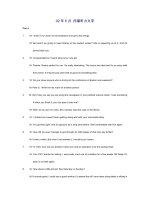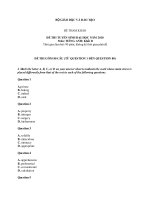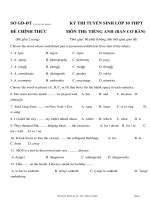Paulina jejuo THAM KHAO
Bạn đang xem bản rút gọn của tài liệu. Xem và tải ngay bản đầy đủ của tài liệu tại đây (189.28 KB, 16 trang )
Paulina Kazmucha
Jejuo
Koreanic (Sillan) language family
제주어, Chejueo, Jeju, Cheju, Jejumal,
제주말,, 제주 사투리 (Jeju saturi) "Jeju dialect"
Spoken territory
The language is spoken in Jeju Island, Jeju Special SelfGoverning Province, Republic of Korea, it also survives in
diasporic enclaves in Japan (Osaka), with the exception of Chuja
in Bukjeju County
General informations
Jejuo ortography and writing system is
based on Hangul but it does not have
one established writing system (한글)
The language belongs to Koreanic
(Sillan) language family
Society use also Korean as the other
language
Jejuo differs greatly from the Korean
dialects of the mainland
Number of speakers
Language Code Request for Jejueo” . William
O'Grady and Changyong Yang and Sejung Yang
(2014): – 5,000 – 10,000 (Endangered) [Ethnic
population – 600,000]
“Atlas of the World’s Languages in Danger” .
Christopher Moseley (ed.) (2010) UNESCO Publishing:
- 5,000 – 10,000 (Severly endangered) [All speakers
are above 70 years of age, all born before 1950]
UNESCO Atlas of the World's Languages in
Danger (2011) – critically endangered
language
It is recognized as a distinct language locally
and also by UNESCO
It can be recognized as a separate language
in comparison to Korean because it is nearly
mutually unintelligible with Korean dialects
of the mainland
Jeju vs Korean
Jejuo lacks of formality and honorific deference to elders
Jejuo perserves many archaic words which have been lost
elsewhere
Jejuo borrowed foreign words e.g from Manchurian, Chinese,
Japanese and especially Mongolian, which don’t exist in
standard Korean
There are many words which appear to be original formations
(possibly from the language of Tamna)
The large amount of words from Mongolian is a natural result
of the 100 years of Mongolian rule on the island, and a large
number of words have to do with horses
Another difference is the slightly changed intonation of
words. The Jeju Dialect tends to use more stress on certain
syllables.
Jejuo vocabulary
Jeju grammar
Proportion of speakers within the
overall population: (3) SEVERELY
ENDANGERED
5,000 – 10,000 native speakers
worldwide whereas ethnic
population is about 600,000 people
INTERGENERATIONAL LANGUAGE
TRANSMISSION: (3/4) – DEFINITIVELY
ENDANGERED/UNSAFE (accordding to
different data)
Some adults in the community are speakers
of the language but the young generation
and children don’t use it at all. Jejuo is used
largely by elderly speakers with a strong
sense of ethnolinguistic identity.
SHIFTS IN DOMAINS OF LANGUAGE USE: (4)
MULTILUNGUAL PARITY
Jejuo is mainly used only in the home and with
the closest family. It may not be the primary
language even in these domains for many
community members.
Korean is rather more dominant among
younger groups of speakers.
Response to new domains and media:
(2) COPING – THE LANGUAGE IS USED
IN SOME NEW DOMAINS
There is some response to new media,
but younger generation is still rather
reluctant to use it even at home.
AVAILABILITY OF MATERIAL FOR LANGUAGE EDUCATION
AND LITERACY, GOVERNMENTAL AND INSTITUNATIONAL
ATTITUDES AND POLICIES: 3/4
- The Jeju Ministry of Education has published 8 online
textbooks for elementary and middle school.
- Publishing various children’s storybooks
- Some newspapers publish Jejuo dialogues and Jejuo
novels in serial form
- The Jejuo Preservation Society publishes a bimonthly
magazine in Jejuo.
- Two radio stations broadcast programs that include some
Jejuo conversations.
- The Jeju Island Ministry of Education designated one
elementary school on Jeju Island as a demonstration school
for teaching Jejuo.
JEJUO FACTS
LANGUAGE STRUCTURE: SOV (the same in Korean)
제주 dialect includes an extra vowel which isn't used currently in standard Korean:
ㆍ /ɒ/
In January 2010, UNESCO added Jeju to its Atlas of the World's Languages in Danger
as a "critically endangered language".
The island of Jeju is historically known for being the land of punishment and exile,
causing its dialect to seem even more inferior to that of the mainland.
Many speakers have been discouraged from using the language during their daily
lives, leading to the massive decrease in use of Jejuo.
Many of the children on the island can understand the Jeju language when it is
spoken to them, but are unable to respond in the same manner. Because of this,
linguists predict that Jejueo may become extinct if the younger inhabitants do not
regularly practice speaking the language.
SAMPLE
Watch it here:
/>
REFERENCES
/> /> />9
/>o/cultural-geography/jeju-island-akorean-cultural-variant
/> />anguage/#.VTPRofmsVfk
/>








